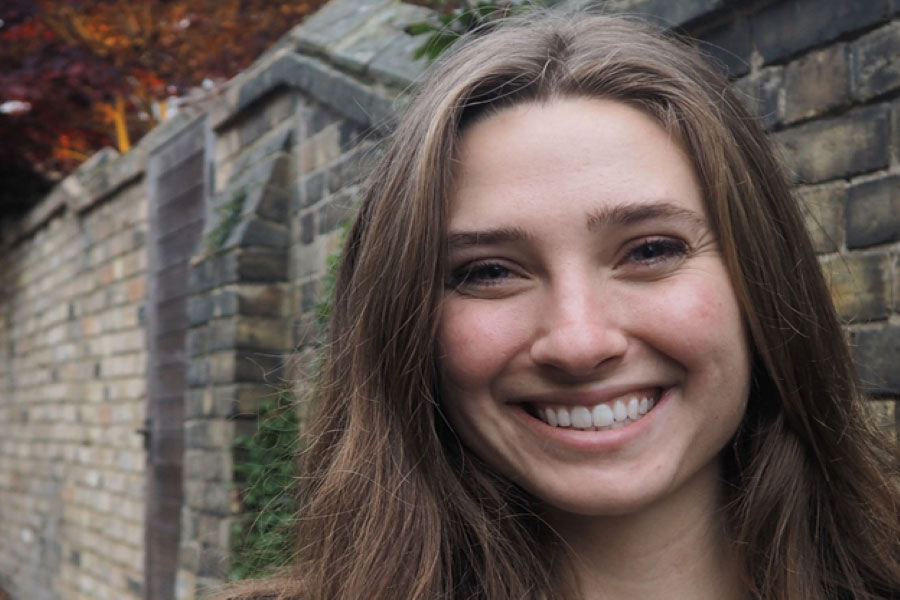Gaining a Passion for Political Economy

Anna DeGrauw
MAIA ’21
MSc from SOAS University of London
Q: What encouraged you to apply to the SAIS-SOAS dual program?
A: Both SAIS and SOAS University of London offered an opportunity to analyze social movements and policy reform to curb structural inequalities, so I became interested in their perspectives and decided to apply for the dual program. Before applying to graduate school, SAIS appealed to me based on its flexibility with dual-degree programs. The depth of SAIS’ reputation and access to career treks, alumni networks, panels, student organizations, speaker series, and career services has made SAIS an important experience in building an early career.
Q: What were you doing before attending the school?
A: Working with grassroots organizers and activists in Uganda, Kenya, Thailand, and the U.S., sparked my interest in studying policy reform at the federal and international levels. Before SAIS and SOAS, my work focused on migration rights, post-conflict environments, and urban communities through a gendered lens.
Q:What program are you in and what do you hope to gain from it? & As a Dual-Degree how has SAIS added to your experiences from SOAS?
A: Currently, I'm an MSc-MA Candidate for an MSc in globalization and development from SOAS and an MAIA from SAIS. I’ll graduate in January 2022.
My coursework at SOAS focused on decolonial approaches to international law, political economy, globalization, and migration. The MSc in globalization and development also included interdisciplinary approaches to social movements, reconciliation in post-conflict areas, and environmental justice in its curriculum in a more academic-centered learning environment.
Comparatively, my experience at SAIS has taken a practitioner approach, often writing policy memos, briefs, and legal analysis as part of our coursework, which has helped me to imagine similar workplace dynamics. The curriculum in the MAIA courses focused on constitutional law, U.S. foreign policy, global food systems, and violence and conflict.
SAIS and SOAS take different but complementary approaches to international relations and development. Both schools encourage students to analyze policy at the structural level, which develops critical thinking skills on uprooting systemic reproductions of inequality. For example, my MSc dissertation at SOAS focused on the political economy of groundwater between the U.S. and Mexico, and its impact on social and environmental rights. Skills gained from both SOAS and SAIS have allowed me to critically assess policy opportunities for the U.S. and Mexican federal governments.
SAIS and SOAS have supported me in finding intentional work, specifically at the Parliamentary Assembly of the Mediterranean and UNESCO International Institute for Education Planning (IIEP). Working with UNESCO IIEP and the Parliamentary Assembly of the Mediterranean (PAM) provided opportunities for growth and inspiration, but both were deeply rooted in the dedication from professors and mentors at SAIS and SOAS. The experiences from SAIS, SOAS, PAM, and UNESCO have been a source of inspiration in considering purposeful and intentional work at the policy level after school.
Q: What has been one of your favorite experiences or classes at the school so far?
A: In 2019, I participated in the European Union and Legal Reform (EULR) Summer School in Igalo, Montenegro, where I met fellow SAIS students and professors for the first time. Listening to the perspectives of my peers from the Western Balkans and Eastern Europe as they discussed EU enlargement helped to contextualize our coursework and offered a formative understanding of international policy. As one of my favorite experiences through SAIS, it led to friendships that are invaluable to me now.
I am also looking forward to traveling to Palestine and Israel with SAIS in January 2022, and I hope the trip has a similar impact on me as EULR did in 2019.
Q: What do you hope to do with your degree after you graduate?
A: The most important lesson I’ve learned from graduate school has been to anticipate change, both within international relations and my personal life. Before graduate school, I wasn’t expecting to be so adamant about studying political economy, but professors from SAIS and SOAS have inspired me to analyze how it intersects with gender equity, border regions, and environmental justice. After graduating, I hope to work on issues related to social equity on the policy level before applying for a Ph.D. program in political economy.
Back to Student Stories